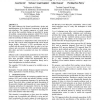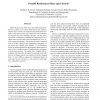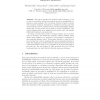112 search results - page 17 / 23 » Behavior based software theft detection |
125
Voted
ICSE
2008
IEEE-ACM
16 years 3 months ago
2008
IEEE-ACM
Automatically detecting bugs in programs has been a long-held goal in software engineering. Many techniques exist, trading-off varying levels of automation, thoroughness of covera...
88
Voted
KBSE
2008
IEEE
15 years 9 months ago
2008
IEEE
—Peer-to-peer (P2P) is becoming a key technology for software development, but still lacks integrated solutions to build trust in the final software, in terms of correctness and...
116
click to vote
ICSE
2001
IEEE-ACM
15 years 7 months ago
2001
IEEE-ACM
The paper addresses the formal specification, design and implementation of the behavioral component of graphical user interfaces. The complex sequences of visual events and action...
119
click to vote
ICSE
2007
IEEE-ACM
16 years 2 months ago
2007
IEEE-ACM
Model checkers search the space of possible program behaviors to detect errors and to demonstrate their absence. Despite major advances in reduction and optimization techniques, s...
129
Voted
VMCAI
2009
Springer
15 years 9 months ago
2009
Springer
This paper describes the methods used in Empire, a tool to detect concurrency-related bugs, namely atomic-set serializability violations in Java programs. The correctness criterion...



